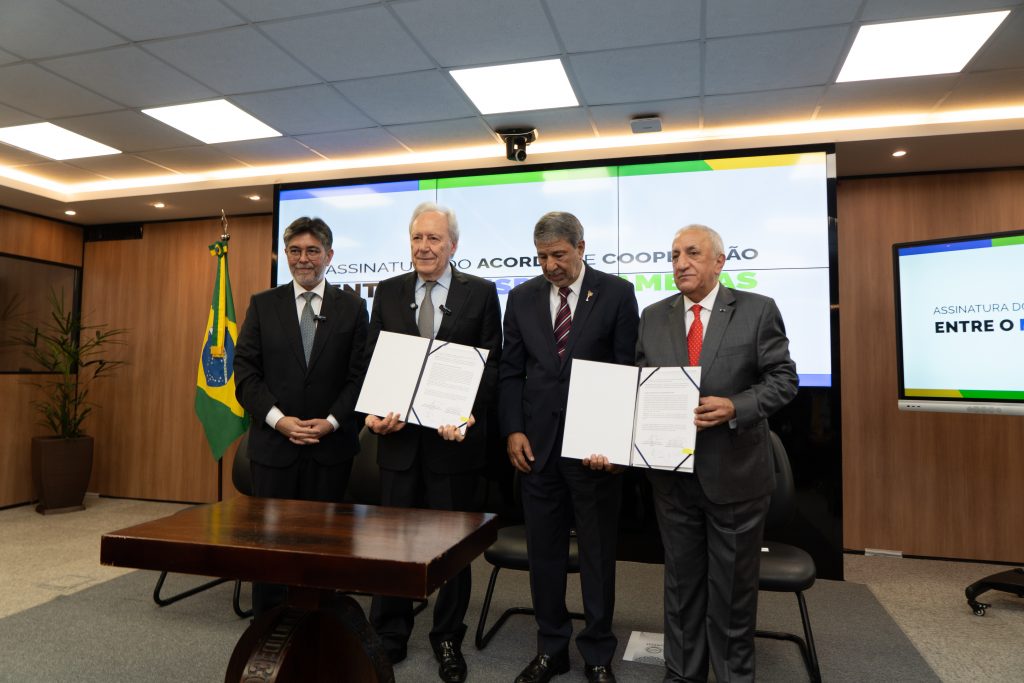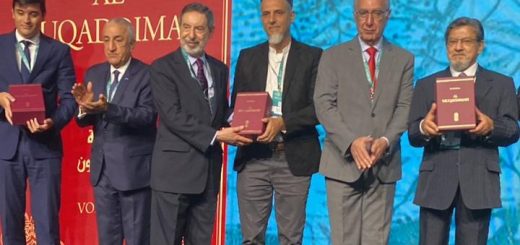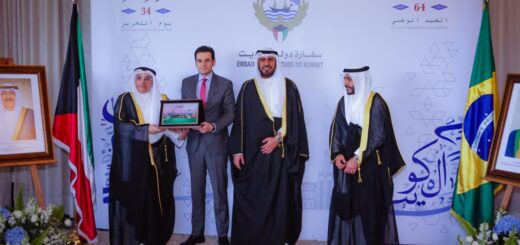FAMBRAS and the Ministry of Justice sign a Technical Cooperation Agreement in favor of migrants, refugees and stateless people

Yesterday (27), in Brasília, the Federation of Muslim Associations of Brazil (FAMBRAS) and the Ministry of Justice and Public Security formalized a Technical Cooperation Agreement aimed at benefiting migrants, refugees, and stateless persons in Brazil.
The agreement, signed during a formal ceremony, marks an important step in the collaboration between the two institutions. It seeks to promote Portuguese language courses as a tool for integration, professional training, and ophthalmological and dental care services.
Representing FAMBRAS, the event was attended by its president, Mohamed Zoghbi, vice-president Ali Zoghbi, director of projects and institutional relations Delduque Martins, and legal director Mohamed Charanek.
Also present were Abdollah Nekounam Ghadirli, ambassador of Iran; Nabil Lakhal, ambassador of Tunisia; Bader Abbas Alhelaibi, ambassador of Bahrain; Ahmad bin Mohammed Al Shebani, ambassador of Qatar; Saleh Ahmad Salem Alzaraim Alsuwaidi, ambassador of the United Arab Emirates; Osama Ibrahim Ayad Sawan, ambassador of Libya; Faisal bin Ibrahim Ghulam, ambassador of Saudi Arabia; Maen Moh’d Sodii Salem Masadeh, ambassador of Jordan; Talal Rashed Almansour, ambassador of Kuwait; Ahmad Mohammed Alshebani, ambassador of Qatar; Ibrahim Alzeben, ambassador of Palestine and dean of the Arab Ambassadors Council in Brazil; Clélio Nivaldo Crippa Filho, representative from the Ministry of Foreign Affairs; and Davide Torzilli, representative of the UN Refugee Agency (UNHCR) in Brazil.
The Minister of Justice and Public Security, Ricardo Lewandowski, highlighted the historical significance of the agreement between the Federal Government and FAMBRAS. “It symbolizes our country’s commitment to welcoming with dignity and respect the peoples from the Middle East and Arab countries seeking refuge in Brazil, making it a second homeland,” he stated.
Jean Uema, National Secretary of Justice, also underscored the importance of the partnership with FAMBRAS: “With the actions we will implement together with FAMBRAS, thanks to FAMBRAS, we will integrate people into the job market, provide dental and medical care. This symbolizes the best of Brazil: our welcoming tradition,” he emphasized.
Mohamed Zoghbi recalled the organization’s history of supporting migrants and refugees: “Since its foundation in 1979, FAMBRAS has been committed to welcoming and empowering these communities. Whether through training or solidarity actions, we have always sought to provide support and opportunities for these individuals to rebuild their lives in Brazil,” he stated.
He emphasized the Ministry of Justice’s trust in FAMBRAS’ capacity to execute transformative initiatives for the reception and training of these populations. “Through this partnership, we strengthen our commitment to building paths of inclusion and dignity for refugees and migrants, creating new perspectives for their integration into our country,” the president added.
FAMBRAS vice-president, Ali Zoghbi, reinforced the social and humanitarian aspect of the agreement. “Essentially, it is aimed at the underprivileged, particularly refugees. We are proposing a memorandum of understanding in which our experience in welcoming Muslims, Arabic speakers, or those with related cultural backgrounds ensures they are well-received here,” he explained.
Ibrahim Alzeben, ambassador of Palestine and dean of the Arab Ambassadors Council, also attended the ceremony. According to him, the agreement is historic and represents an act of justice and humanity, a joint effort to address the challenges of migration and refuge. “It is historic; it represents a gesture of justice and humanity, as it provides new opportunities for refugees and migrants seeking a fresh start in Brazil,” he explained.
According to the “Refuge in Numbers 2024” report, Brazil received 58,628 requests for refugee status recognition in 2023, representing people from 150 different countries. This is 8,273 more requests than in 2022, when the country received 50,355 applications of this nature.



